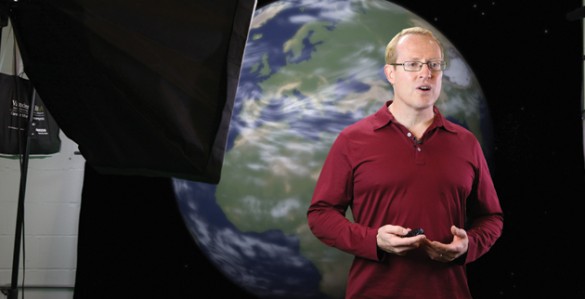In the first outcome of the Chancellor’s Committee on Social Media and the Internet, MOOCs launch at Vanderbilt March 4

More than 136,000 people have registered to attend five Vanderbilt courses this spring and summer—attend them virtually, that is. The university’s first foray into massive open online courses—or MOOCs—launches March 4 on the platform Coursera.
Visit the Digital Learning website for videos and more information.
“The public response to these offerings speaks well for Vanderbilt’s reputation in the world at large. People are demonstrably interested in what we do,” Associate Provost for Undergraduate Education Cynthia Cyrus said. “It also shows the way in which digital courses can be a sort of megaphone, amplifying the wonderful knowledge and exciting ideas our faculty bring and sharing them with the global community.”
The Coursera partnership is one of the first outcomes of the Chancellor’s Committee on Social Media and the Internet, convened in February 2012.
“Because Chancellor Zeppos put this committee in place, Vanderbilt was able to take action very quickly,” said Douglas Schmidt, professor of computer science, associate chair of the computer science and engineering program and one of the faculty teaching a Coursera course this semester. “[rquote]We’re now poised to be on the cutting edge of, and leading new developments in, this arena, rather than just reacting to them.”[/rquote]
The new efforts build on the decade-long implementation of distance learning at Vanderbilt’s School of Nursing. Jamie Pope, a lecturer at the school, is teaching a Coursera course on nutrition. More than 37,000 students have registered.
“I think the practical application aspect of my course has made it appealing,” Pope said. “I’ve seen the nutrition classes in the School of Nursing grow over the last decade to the point that we fill lecture halls with waiting lists. What we are seeing on Coursera is an extension of that.”
Schmidt and other participating faculty believe that teaching through Coursera will improve the experience of their own students in Vanderbilt classrooms.
“I plan to use the videos I am producing for Coursera for the face-to-face class I am teaching at Vanderbilt now,” he said. “We won’t have to spend so much time in class going over introductory material. The students can watch the videos on their own time.
“We can then spend the time in class doing what people come to Vanderbilt for—mentorship and collaboration and creating a design studio experience in the classroom,” he said. “[lquote]It’s really about personalizing education for the students.”[/lquote]
Vanderbilt’s pilot courses are being produced largely with existing resources—staff and students from across campus pitching in on video production—on an extremely
tight timeline.
“The provost asked me to participate on a Friday, and our course profiles went live on Coursera the next Wednesday,” Pope said. “So I didn’t have much time to overthink the prospect and jumped right in on course planning.”
Schmidt’s course and that of David Owens, professor of the practice of management and innovation, begin the first full week of March. Owens’ own experience taking a Coursera course—and failing to complete the assignments—led him to customize his course
on innovation to include different levels of engagement.
“One thing I’ve been thinking about is that it is unfortunate that people don’t press through,” Owens said. “I set my class up to include three levels. The basic level involves watching all of the videos—approximately 20 hours—and taking embedded quizzes along the way.” Owens’ second tier involves completion of different tasks and exercises, while the third requires participation in a group project.
Tens of thousands of “Courserians” are registered for Owens’ course, and it also will be offered in a special section to a group of Israeli and Palestinian youth through an innovative partnership called Project YaLa, or Young Adult Leadership Alliance. YaLa aims to connect Israeli and Palestinian youth through educational programs, cultural exchange and community service.
“We’ll have these students work together in a very aspirational and positive way with lots of imagination,” Owens said. “[rquote]That kind of session is meaningful and may be a way to scale and leverage the Coursera model with smaller groups of students, where we can keep interaction high.”[/rquote]
And while students globally have the potential to benefit from the online classes, Cyrus and others see this as a potential boon for Vanderbilt alumni, too.
“Our alumni are excited to have the chance to be ‘back in the classroom’—both to remind themselves of what makes a Vanderbilt education special and to sample pieces of our campus offerings that they might not have had time for when they were here,” she said.
The pilot project will continue in fall 2013, when courses will be hand-selected so that each of the colleges and schools has the chance to participate. Cyrus anticipates having an open call for additional Coursera proposals during the 2013-14 academic year.
Watch video of a Feb. 21 conversation on MOOCs with Schmidt and Pope.
Vanderbilt’s pilot Coursera courses
Pattern-Oriented Software Architectures for Concurrent and Networked Software
Doug Schmidt
Leading Strategic Innovation in Organizations
David A. Owens
Data Management for Clinical Research
Paul A. Harris, Stephany Duda and Firas Wehbe
Nutrition, Health and Lifestyle: Issues and Insights
Jamie Pope
Online Games: Literature, New Media and Narrative
Jay Clayton